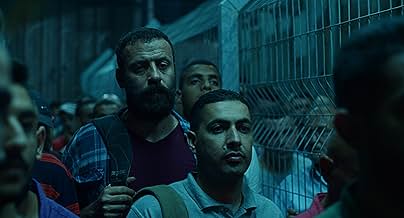NOTE IMDb
7,2/10
2,3 k
MA NOTE
Un père de famille palestinien coincé de l'autre côté du mur de séparation tente de rejoindre l'hôpital pour être avec son fils.Un père de famille palestinien coincé de l'autre côté du mur de séparation tente de rejoindre l'hôpital pour être avec son fils.Un père de famille palestinien coincé de l'autre côté du mur de séparation tente de rejoindre l'hôpital pour être avec son fils.
- Récompenses
- 19 victoires et 6 nominations au total
Histoire
Le saviez-vous
- AnecdotesOfficial submission of Jordan for the 'Best International Feature Film' category of the 93rd Academy Awards in 2021.
Commentaire à la une
I once listened to a Jordanian Ambassador to the USA talk before an audience about his search for a word in Arabic which meant "compromise" in the sense of the very western English expression to have a "win-win situation" where both sides give up something in order to gain something and both feel like they have 'won'. He said that despite his best efforts he never found such a word in Arabic. He said that in Arabic culture there is only a sense of winning and losing. If one loses something he cannot be a winner. It is all or nothing. Black and White! The Victors and the Vanquished! All of which he said illustrated the culture gap between western democracies and Arab countries. This film somewhat explores this ideological divide.
This ideological divide is essentially the huge gap that separates Mustafa who refuses to compromise his non-Israeli Arab ideology for the welfare of his family, and Mustafa's Arab-Israeli compromising wife who he allows to live on the other side of the wall in order to raise his children in 'better' schools, etc. The fact that they still love each other in this film is a bit of an anomaly in this war of cultures.
This theme is also the background to the huge gap that separates the Arabic speaking Muslims of the West Bank from the Hebrew speaking Israelis on the other side of the wall. While Israeli's have at times tried be more pragmatic in their relations with the Arab speaking Muslims, their efforts have not been generally reciprocated and the Israelis built a wall of separation as much to keep non-Israeli Arabs out as to keep Israelis in.
Neither side is innocent in the ongoing conflict and Mustafa and his wife epitomize this divide to a large degree: the divide that separates idealists and pragmatists which ultimately keep Mustafa and his wife on opposite sides of the wall. His wife is effectively a pragmatist as are most of the Israeli Arabs who live in Israel. Mustafa is an idealist who will not compromise on his principals and is willing to give up a normal family existence living with his wife and children for a life of separation.
Who's to blame for this wall of separation? The Israelis? The non-Israeli Arabs? The film doesn't really explore the blame game very deeply, it just tries to film the craziness of it all mostly, though not exclusively, through the filter of the eyes of non-Israelis. So a bit one-sided as might be expected and no real solutions are presented ... and the craziness just continues.
I have no personal skin in this conflict and I do not believe given the history and cultures of both sides that there is likely to be any really viable solution that would meet the definition of a win-win situation anytime in the near or the more distant future. This film sort of illustrates this as much as it can be illustrated.
It is worth a watch, though the film offers little hope in my opinion for any real change as it documents the 'craziness' of both sides!
This ideological divide is essentially the huge gap that separates Mustafa who refuses to compromise his non-Israeli Arab ideology for the welfare of his family, and Mustafa's Arab-Israeli compromising wife who he allows to live on the other side of the wall in order to raise his children in 'better' schools, etc. The fact that they still love each other in this film is a bit of an anomaly in this war of cultures.
This theme is also the background to the huge gap that separates the Arabic speaking Muslims of the West Bank from the Hebrew speaking Israelis on the other side of the wall. While Israeli's have at times tried be more pragmatic in their relations with the Arab speaking Muslims, their efforts have not been generally reciprocated and the Israelis built a wall of separation as much to keep non-Israeli Arabs out as to keep Israelis in.
Neither side is innocent in the ongoing conflict and Mustafa and his wife epitomize this divide to a large degree: the divide that separates idealists and pragmatists which ultimately keep Mustafa and his wife on opposite sides of the wall. His wife is effectively a pragmatist as are most of the Israeli Arabs who live in Israel. Mustafa is an idealist who will not compromise on his principals and is willing to give up a normal family existence living with his wife and children for a life of separation.
Who's to blame for this wall of separation? The Israelis? The non-Israeli Arabs? The film doesn't really explore the blame game very deeply, it just tries to film the craziness of it all mostly, though not exclusively, through the filter of the eyes of non-Israelis. So a bit one-sided as might be expected and no real solutions are presented ... and the craziness just continues.
I have no personal skin in this conflict and I do not believe given the history and cultures of both sides that there is likely to be any really viable solution that would meet the definition of a win-win situation anytime in the near or the more distant future. This film sort of illustrates this as much as it can be illustrated.
It is worth a watch, though the film offers little hope in my opinion for any real change as it documents the 'craziness' of both sides!
- michael_wells_gr
- 4 mars 2024
- Permalien
Meilleurs choix
Connectez-vous pour évaluer et suivre la liste de favoris afin de recevoir des recommandations personnalisées
- How long is 200 Meters?Alimenté par Alexa
Détails
Box-office
- Montant brut mondial
- 76 485 $US
- Durée1 heure 36 minutes
- Couleur
Contribuer à cette page
Suggérer une modification ou ajouter du contenu manquant


![Regarder Trailer [OV]](https://m.media-amazon.com/images/M/MV5BOTUyZTlkZTktNjEyZS00NmE5LWJlZDEtZGZlODRlZTMxYmIwXkEyXkFqcGdeQXRyYW5zY29kZS13b3JrZmxvdw@@._V1_QL75_UX500_CR0)




















